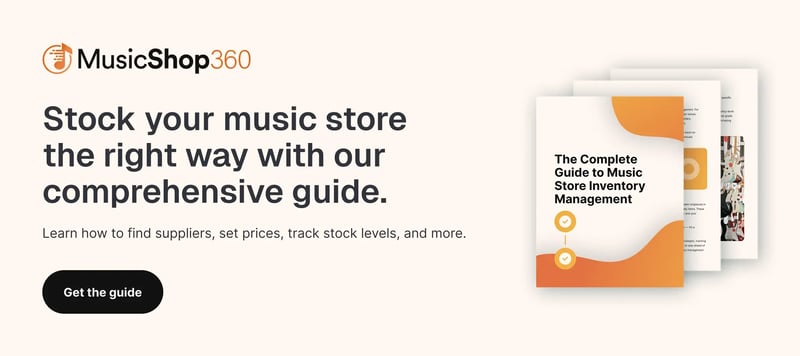
Selecting the right point of sale (POS) system is a must for any business — but it’s especially important to find one designed for the unique needs of your industry.
A system made specifically for music stores is valuable because you deal with specialized scenarios like instrument rentals, lesson scheduling, and complex inventory tracking involving various accessories and sheet music.
A generic POS system won’t cut it. You need a solution designed to address these unique challenges, giving you the tools for managing rentals, tracking repairs, and integrating with music-related platforms.
In this blog, we dive into 12 essential features to consider when evaluating different providers (and give you our top five POS picks).
Let’s get started.
12 Essential Features for Music POS Systems
The right POS system supports your music store’s success — but what features are most important? Here are 12 essential features to look for when comparing providers to make sure you pick a solution that meets your business’ needs.
1. Efficient Sales and Checkout Process
A quick and easy checkout process keeps customers satisfied and your music store running smoothly. It’s important to look for systems that support multiple payment options like cash, credit and debit cards, contactless payments, and online payments.
This gives customers the flexibility to shop and pay how they want to. Also, consider solutions that facilitate unique sales scenarios like instrument rentals and layaways to accommodate your diverse business needs.
Related Read: 5 Ways the Music Retail Sector Is Evolving
2. Advanced Music Inventory Management
Accurate inventory tracking and restocking is crucial if you want to avoid overselling and stockouts. Opt for software that offers real-time stock tracking, automatic inventory updates, and integration with supplier databases. These features keep your stock levels accurate without the hassle of carrying too much inventory.
3. Comprehensive Rental Management
Comprehensive rental management is essential if your music store offers equipment or instrument rentals, particularly when working with schools. An ideal music store POS system should include tools for setting up online rental portals, managing contracts, and sending automated reminders for due dates. This streamlines the rental process and makes customers happy because it’s easier for all parties involved.
4. Robust Reporting and Analytics
To make informed decisions and to strategically plan, it’s necessary to gain access to insightful data. Choose a system that gives you detailed sales reports, customer behavior analytics, and forecasting tools. These features help you effectively manage inventory and support data-driven business decisions.
5. Seamless Third-Party Integrations
Integration capabilities allow for better flexibility and functionality, so you can easily adapt to your unique business needs. The best software supports seamless integration with music store applications like Reverb, My Music Staff, and marketing tools to ensure scalability as your business grows.
6. Integrated Online Presence
A strong online presence helps you reach a broader audience and increase sales. Look for systems that set you up with an integrated website that has e-commerce capabilities. This way, you can easily sell online and sync your inventory in real time. Features like user-friendly web design and mobile compatibility significantly boost customer engagement.
7. Streamlined Data Migration
Smooth data migration is critical when transitioning from an old system to a new POS software. Make sure the provider offers comprehensive data migration services to minimize disruption and eliminate data loss risks. Expert support during this transition can smooth over your operations from day one.
Related Read: Migrating Your Data With Music Shop 360
8. Cloud-Based Advantages
Cloud-based systems offer enhanced accessibility, scalability, and security for modern music stores. Make sure the POS software is cloud-based for easy access from any location, seamless updates, and robust security measures that comply with industry standards. This also supports business growth without hardware upgrades.
9. Smooth Work Order Management
Managing repair and service requests efficiently improves customer service and your operational workflow. If you receive work orders to fix instruments, you need software that offers tools for creating and tracking them. A solid POS system also has features for maintaining clear communication regarding repairs and integrating seamlessly with billing systems for transparent invoicing.
10. Automated Marketing Features
Automation in marketing saves time and engages customers through targeted campaigns. Look for software that includes or integrates with email marketing platforms and customer relationship management (CRM) systems.
With a POS solution like this, you can automatically send customizable marketing emails — like a back-to-school promotion targeted specifically to parents. These features are crucial for building lasting customer relationships and boosting sales.
11. Easy Lesson Scheduling
If you’re a music retailer that offers educational services, you need an easy and efficient way to schedule lessons. A well-organized scheduling system helps you maximize your resources and create customer loyalty.
Look for features that allow you to schedule, manage bookings and payments, and integrate with lesson software like My Music Staff. This ensures smooth communication between instructors and students while improving overall scheduling efficiency.
12. Complex Inventory Tracking
Managing a diverse inventory — including various accessories and sheet music — requires precise tracking to prevent losses and fulfill customer demand effectively. Select a POS system that offers detailed inventory tracking capabilities, allowing for categorization by type, brand, or model. Real-time updates and integration with vendor catalogs help to maintain accurate stock levels.
When you choose a POS solution with these essential features, you can help your music store thrive in a competitive market.
Compare the Top Music POS Providers
To run a successful music store, you need to pick the POS system that works the best for your business. Here are the top providers to consider.
5. Shopify
Shopify offers basic inventory management suitable for businesses with online and physical stores, allowing you to track your stock levels and sync product information. It also excels in e-commerce integration and provides basic CRM functions, like customer data tracking and marketing campaigns.
Their POS software lacks specialized features for rental and repair management, which are critical for music stores — but it does offer various plans and add-ons to grow with your business needs. Shopify also has extensive training documentation and support via community forums and tutorials.
Pricing: Shopify offers four pricing tiers: Basic at $29 per month, Shopify at $79 per month, Advanced at $299 per month, and Plus at $2,300 per month.
4. Square
Square supports basic inventory features that are suitable for smaller operations without complex needs. Their software allows integration with online sales platforms and manages in-store transactions efficiently.
Square has basic customer management features, including simple loyalty programs. It’s easy to set up and ideal for small to medium-sized businesses with room for growth.
It doesn’t offer built-in features for rentals and repairs, requiring third-party solutions — but it does have a robust knowledge base and customer support options.
Pricing: Square offers a Free plan with basic features for small businesses, a Plus plan with advanced features for $29 per month, and a Premium plan with custom pricing.
3. AIM by Tri-Tech
AIM by Tri-Tech includes advanced inventory management tailored to music stores, including rental inventory tracking. They offer integration with e-commerce platforms, and its CRM tools are suitable for niche markets like music retail.
Their software features strong rental management capabilities, but lacks some seamless integration features found in other POS systems. With its robust industry-specific features, it’s designed to scale with specialized businesses — plus, they have targeted support and training to help businesses optimize their operations.
Pricing: Custom pricing is available upon request.
2. Lightspeed
Lightspeed’s advanced inventory management is suitable for larger, multilocation operations. It features strong integration with e-commerce platforms and provides excellent data sync between online and offline sales.
Lightspeed is known for its scalability, making it suitable for large enterprises. It has extensive resources and personalized support for businesses — but it’s not specifically designed for rental and repair management and requires additional modules or integrations.
Pricing: Lightspeed offers three pricing tiers: Basic at $89 per month, Core at $149 per month, and Plus at $289 per month, with custom options and separate hardware available for larger businesses.
1. Music Shop 360
Music Shop 360 has automatic updates and integration with supplier databases, making it ideal for music stores. It includes a seamlessly integrated website that syncs data and in-store inventory in real time.
This software’s comprehensive rental management and service tracking is tailored specifically for music stores. CRM features include loyalty programs and automated marketing campaigns designed for music retail — plus, the cloud-based platform allows for multilocation management and flexible integrations like Reverb and My Music Staff.
Music Shop 360 gives you unlimited training and customer support focused on personalized assistance, too.
Pricing: Music Shop 360 offers customizable pricing plans with no hidden fees.
When choosing a POS system for your music store, it’s important to consider features that cater specifically to the unique needs of your business.
Stop Comparing — Music Shop 360 Can Transform Your Music Store
Choosing the right point of sale software is essential for any music store hoping to improve efficiency, boost customer satisfaction, and drive growth. Luckily, Music Shop 360 stands out as a comprehensive solution tailored specifically for the unique needs of music retailers — with everything you need to run a successful business.
Schedule a demo today to experience the benefits of using a specialized POS system that truly understands your business needs.




 by
by 

